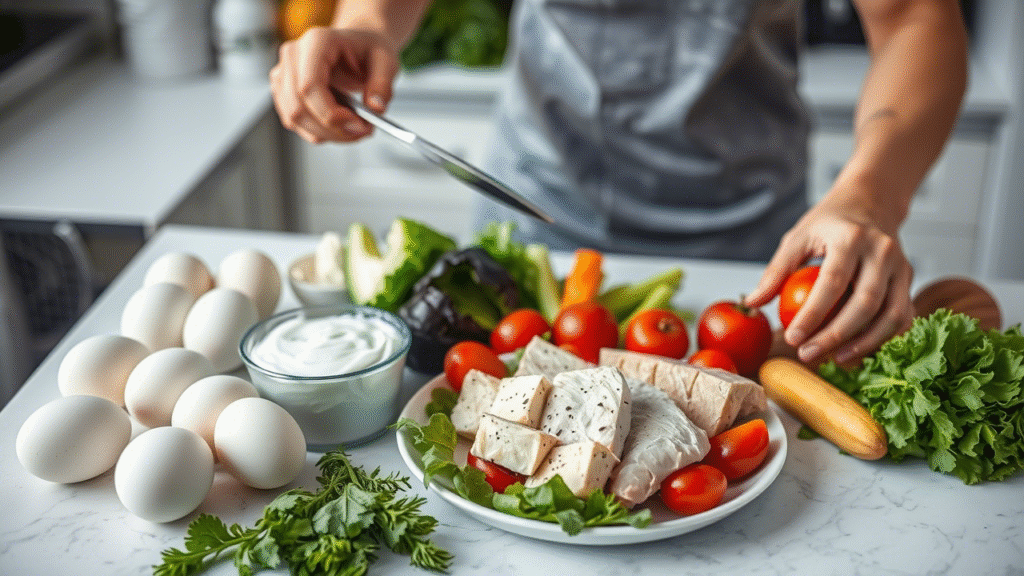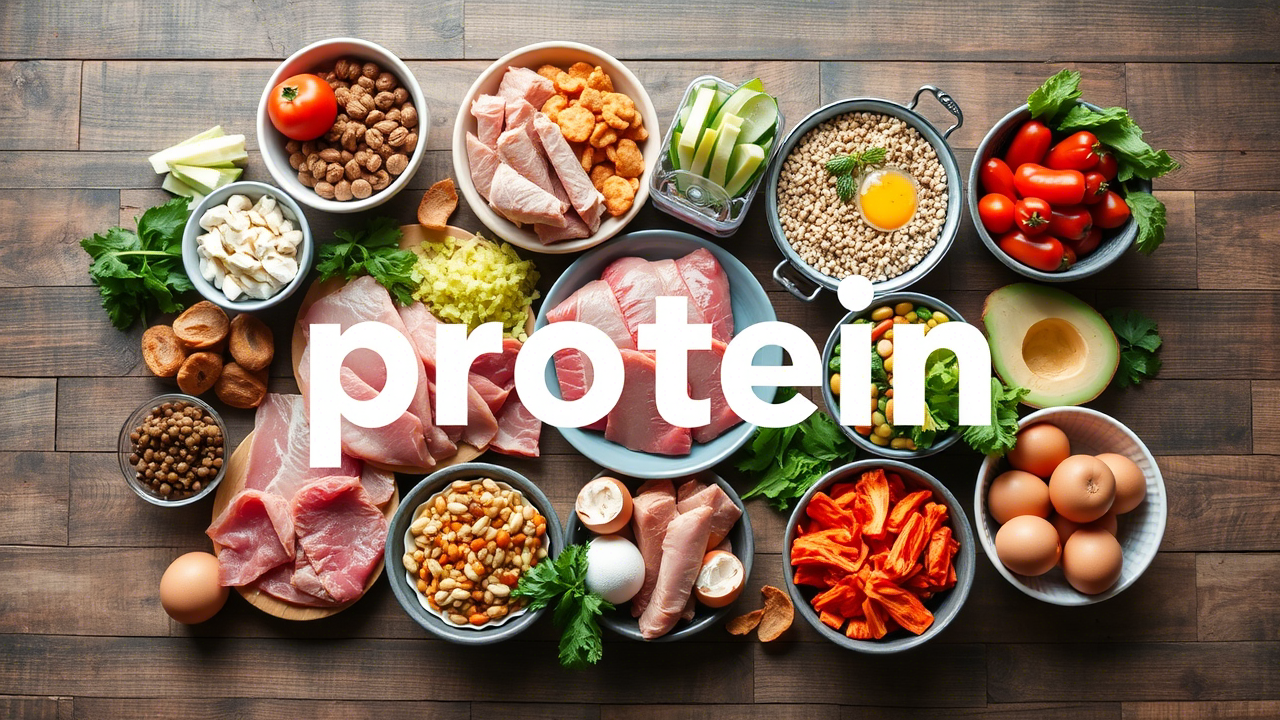Introduction: Why Nutrition Is the Backbone of Strength
Whether you’re lifting weights, training for endurance, or just trying to build a healthier lifestyle, one fact remains: your body is built in the kitchen. A solid nutrition guide plays a crucial role in supporting your muscle-building goals, maximizing energy levels, and optimizing overall performance.
In this guide, we break down everything you need to know about a high protein diet, balanced meals, and practical nutrition tips to fuel your body for strength and success.
1. The Role of Protein in Muscle Growth
Protein is the king of muscle-building foods. When you train, your muscles experience tiny tears. Protein helps repair and rebuild these fibers, making them stronger and larger over time.
How much protein do you need?
- For most people aiming to build or maintain muscle:
👉 1.2 to 2.0 grams per kilogram of body weight per day. - For athletes or intense lifters:
👉 Closer to 2.2 grams/kg may be beneficial.
Top Protein Foods:
- Chicken breast
- Eggs
- Greek yogurt
- Cottage cheese
- Lentils & chickpeas
- Tofu & tempeh
- Protein powders (whey, pea, casein)

2. Balanced Meals: The Right Way to Eat for Strength
While protein is essential, it’s not the only macronutrient you need. Balanced meals should include:
- Protein: for growth and repair
- Carbohydrates: your body’s main energy source
- Fats: support hormones and absorb vitamins
- Vitamins & Minerals: for recovery, immunity, and energy
Sample Balanced Meal (Muscle Gain):
- Grilled salmon (protein & healthy fats)
- Quinoa (complex carbs)
- Steamed broccoli (fiber & vitamins)
- Avocado slices (extra healthy fats)
3. Meal Prepping for Strength
Staying consistent with your nutrition is easier when you meal prep. Preparing meals ahead of time helps you avoid junk food, save money, and hit your macros daily.
Steps to Successful Meal Prepping:
- Plan your meals for the week using a high protein and clean eating focus.
- Grocery shop with a list of fresh, whole foods.
- Cook in bulk (grilled chicken, boiled eggs, brown rice, roasted veggies).
- Store in containers for quick grab-and-go meals.
Meal Prep Ideas:
- Chicken, sweet potato, and green beans
- Turkey chili with black beans
- Overnight oats with protein powder and berries
- Protein-packed quinoa salad
4. Smart Snacking for Muscle Gain
Snacking isn’t just for hunger—it can be part of your sports nutrition plan if done right.
Protein-Packed Snack Options:
- Greek yogurt with almonds
- Protein bars (low sugar)
- Hard-boiled eggs
- Tuna with crackers
- Peanut butter on whole grain toast
Pro Tip: Avoid snacks high in sugar and refined carbs—they spike your insulin and lead to energy crashes.
5. Clean Eating vs. Flexible Dieting
Clean eating focuses on whole, unprocessed foods like vegetables, fruits, lean proteins, and whole grains. It’s ideal for reducing inflammation and supporting your gut health.
Flexible dieting (IIFYM: If It Fits Your Macros) allows occasional treats while still hitting your protein, carbs, and fats.
Which one is better?
➡️ For beginners: Clean eating is a safer approach.
➡️ For experienced lifters: Flexible dieting allows sustainability.
Find what works for you and stick with it consistently.
6. Boosting Metabolism with the Right Foods
Certain foods naturally increase your metabolism, helping you burn more calories throughout the day—even at rest.
Metabolism Boosting Foods:
- Green tea
- Chili peppers (capsaicin)
- Coffee (moderate)
- High-protein foods (thermic effect of food)
- Water-rich veggies (like cucumber, spinach)
Stay Hydrated!
Dehydration can lower your metabolism. Aim for 8–10 glasses of water daily—even more if you train hard.
7. Pre-Workout and Post-Workout Nutrition
Pre-Workout Meal (30–60 min before):
- Oatmeal + banana + whey protein
- Brown rice + chicken breast
- Whole grain toast + almond butter
This gives your body fuel for training and prevents muscle breakdown.
Post-Workout Meal (within 1 hour):
- Whey protein + fruit smoothie
- Eggs + whole grain toast
- Grilled chicken + sweet potato
Post-workout nutrition supports muscle recovery and replenishes lost glycogen.
8. Supplements to Consider
Whole foods should always come first, but sports nutrition supplements can support your muscle and strength journey.
Top Supplements for Strength and Performance:
- Whey Protein: Fast digesting protein for post-workout
- Creatine Monohydrate: Improves strength and power output
- BCAAs: Useful for recovery (especially during fasted training)
- Multivitamins: Fills micronutrient gaps
- Fish Oil (Omega-3): Reduces inflammation and improves joint health
9. Protein Timing: Does It Matter?
Yes! The concept of nutrient timing suggests that spreading your protein intake evenly throughout the day helps maximize muscle protein synthesis.
❌ Wrong Way:
100g protein at dinner only.
✅ Right Way:
30g at breakfast
30g at lunch
30g post-workout
30g dinner
10. Sample Weekly Meal Plan for Strength & Clean Eating
Day 1 Example:
- Breakfast: Scrambled eggs, whole wheat toast, avocado
- Snack: Greek yogurt with walnuts
- Lunch: Grilled chicken, brown rice, spinach
- Snack: Protein shake + banana
- Dinner: Baked salmon, quinoa, broccoli
Repeat with variety across days using lean proteins, whole grains, and colorful veggies.
Final Tips: Build Strength from the Inside Out
✅ Eat a variety of colorful foods—more colors = more nutrients
✅ Don’t skip meals—fuel your body consistently
✅ Use meal prepping to stay disciplined
✅ Stay hydrated—water affects strength and recovery
✅ Keep your protein intake high and meals balanced
Conclusion: Fuel Your Strength Journey with Smart Nutrition
Your training is only half the battle—nutrition is the other half. By following this nutrition guide and focusing on protein-rich meals, clean eating habits, and consistent meal planning, you’ll build muscle, burn fat, and increase energy levels.
Remember: Strong bodies are built on strong foundations—and that foundation starts with the food you choose every day.
